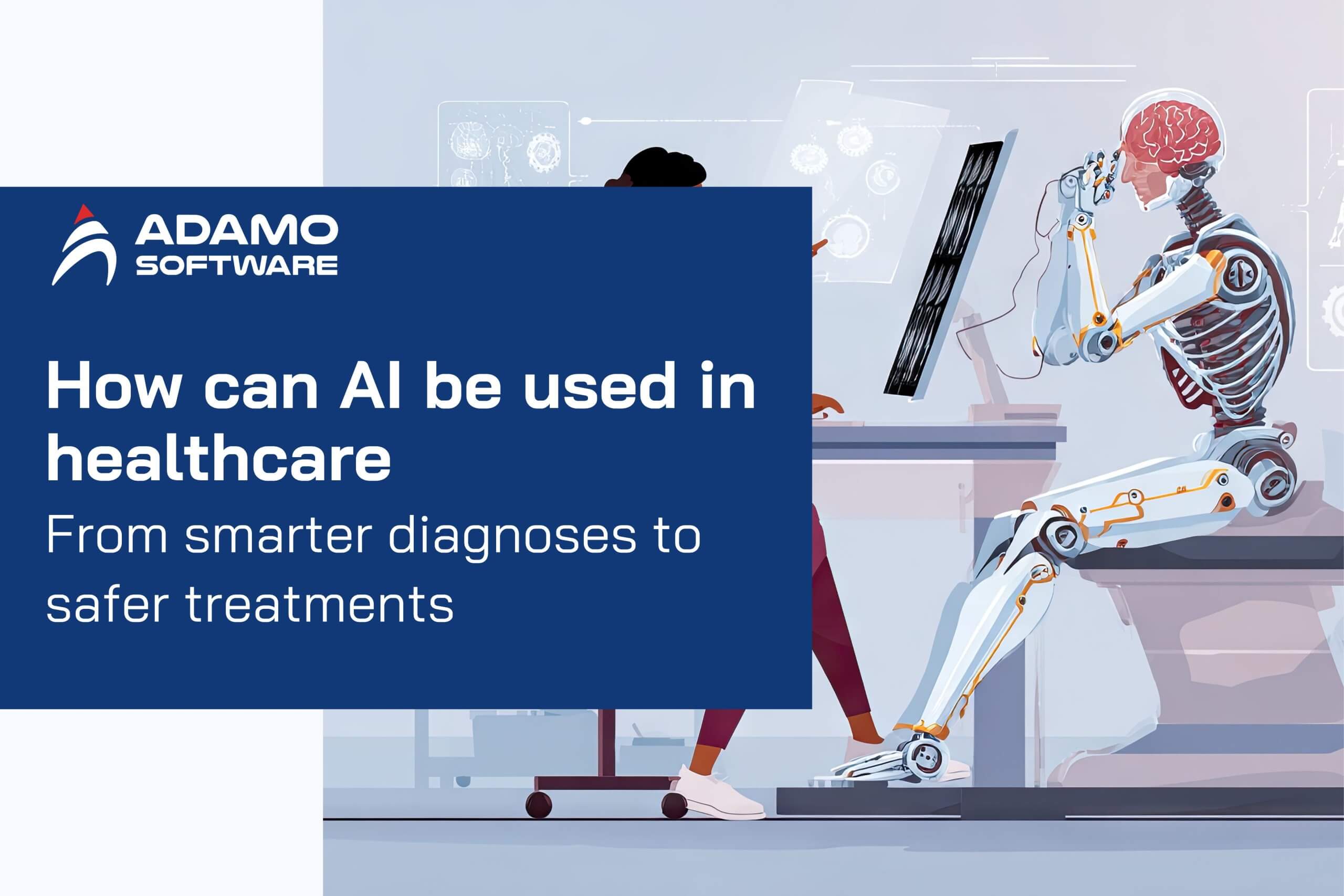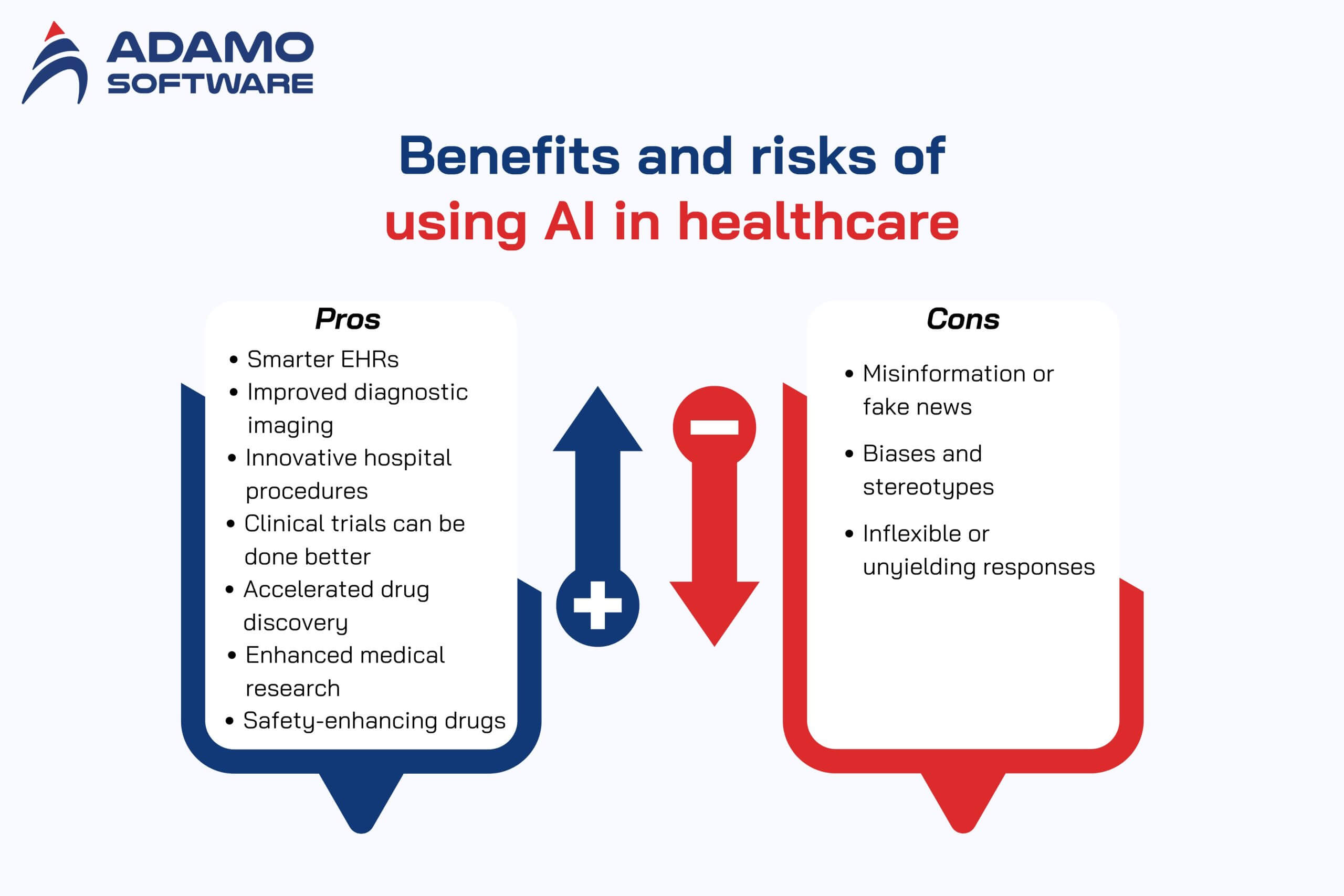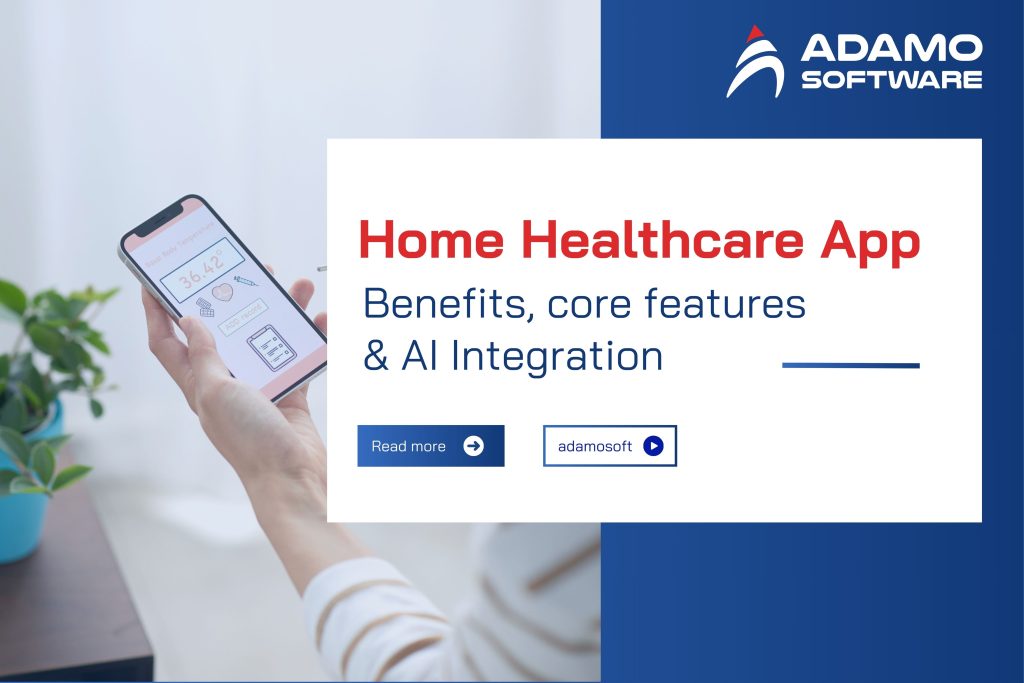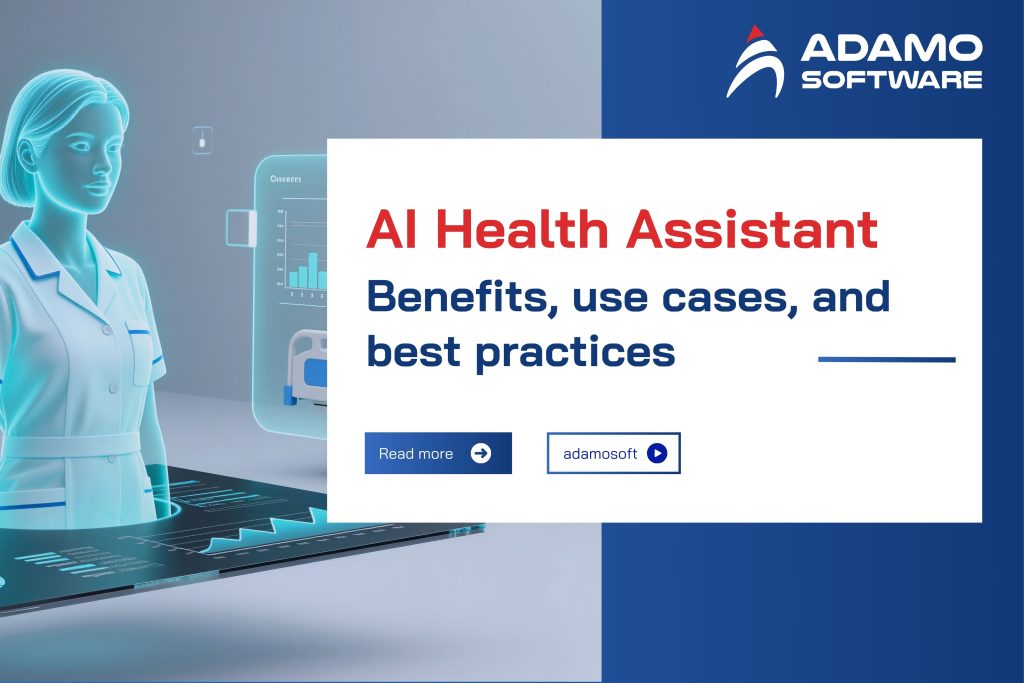How can AI be used in healthcare: From smarter diagnoses to safer treatments

Wondering how can AI be used in healthcare? Explore key benefits, real examples, and future trends shaping modern medicine.
AI isn’t science fiction anymore; it’s being used in medicine today. The interaction between doctors, patients, and hospitals is already evolving as AI is used to diagnose diseases more accurately and to develop drugs more efficiently. However, these breakthroughs come with significant questions: how can AI be used in healthcare, and what challenges should we be ready for?
In this blog, we’ll look at the most critical pieces of information about the growing role of AI in healthcare. You will learn how it functions, what it offers, and where it can lead us in the coming decade. By exploring these points, we’ll also consider how can AI be used in healthcare to transform medical practice and improve patient outcomes.
Here’s what we’ll cover:
- What is AI in healthcare?
- What are the benefits of AI in healthcare
- Main risks of using AI in healthcare
- How can AI be used in healthcare – Top 5 examples
- The future of AI being used in healthcare
I. What is AI in healthcare?
In the medical field, artificial intelligence (AI) employs machine learning, natural language processing, and deep learning to achieve better patient and healthcare outcomes.
Regarding how AI can be used in healthcare, one can say that it allows for the analysis of large amounts of data. Therefore, it provides predictive information to enhance care.
Doctors can now make faster and more accurate diagnoses with the aid of AI. Administrators have also become efficient when finding electronic health records quickly and safely.
Moreover, patients can benefit from asking how can AI be used in healthcare to get personalized treatment plans. With AI, these plans will be prompt and appropriate to their specific conditions and lifestyles.
II. What are the benefits of AI in healthcare?

It has become evident that AI provides increased efficiency, reduces errors, speeds up discoveries, and enhances clinical practice and patient care.
The benefits of AI in healthcare that make it effective include:
- Smarter electronic health records (EHRs)
- Improved diagnostic imaging
- Innovative hospital procedures
- Clinical trials can be done better
- Accelerated drug discovery
- Enhanced medical research
- Safety-enhancing drugs
1. Smarter electronic health records (EHRs)
AI-powered EHRs equip physicians with brief summaries, automate clinical notes, and make navigation easier. This will ease the load on the administration, and the physicians will be provided with vital information that will be readily available.
AI can be used to enhance the quality of care and clinical decision-making. It does this by reducing the amount of time spent on paperwork, enabling doctors to spend more time with patients. This is one clear example of how AI can be used in healthcare.
2. Greater diagnostic image accuracy
Radiology departments use AI to process scans and detect abnormalities more rapidly and precisely. These devices assist in the earlier diagnosis of diseases compared to conventional diagnostic devices.
AI can also help radiologists identify possible areas of problems, facilitate timely intervention, and minimize any errors that arise when manually analyzing images. This demonstrates another answer to how can AI be used in healthcare.
3. Effective hospital practice
Scheduling systems based on AI can optimize the assignment of personnel and equipment. This helps to enhance efficiency and minimize time waste in hospital operations.
Moreover, AI-powered robots are taught to complete delivery routes with medicines, lab samples, and food, which ensures a productive logistics system in hospitals.
4. Better clinical trials
Pharmaceutical companies use AI to study EHRs and demographics, more precisely selecting the right individuals who can participate in a clinical trial.
Another way in which AI is helpful is to identify subgroups of successful trials that have failed. This can offer valuable insights that can inform future drug development strategies. That makes clinical trials another strong case of how can AI be used in healthcare.
5. Faster drug development
Due to molecular interaction patterns, AI models can see compounds that can be beneficial for treatments. The process minimises the use of lengthy processes of trial and error.
Through faster research, AI can aid drug manufacturers in developing promising drugs for clinical trials faster, reducing costs, and improving discovery success rates.
6. Stronger medical research
NLP can identify meaningful information in unstructured clinical documentation in EHRs, which researchers can use to identify side effects or early signs of disease.
Researchers can also use standards such as mCODE to compare the effectiveness of treatments across platforms and expand collaboration and clinical knowledge.
7. Safer medications
AI analyzes clinical data to evaluate the efficacy and risk of different drugs on various populations of patients. This helps them enhance safety across multiple patient groups.
In the case of retrieval-augmented generation (RAG), AI systems merge pharmaceutical data to identify adverse drug reactions and aid in safer prescribing behavior.
III. Main risks of using AI in healthcare
Discussing the ways of AI application to healthcare, it is also necessary to note the risks. AI-based chatbots and diagnostic applications have a prospect, and they are not perfect. Abuse, lack of training, statistics, and uncontrolled outputs can pose significant problems to the doctors and the patients.
These concerns highlight why the question of how can AI be used in healthcare must include a careful look at its limitations.
The key risks include:
- Misinformation or fake news
- Biases and stereotypes
- Inflexible or unyielding responses
1. Misinformation or fake news
Chatbots will generate incorrect responses to poorly-qualified or misdirected data. They even make up citations or misunderstand scientific papers.
These fake reactions may sound professional and credible. However, false outputs can be confused with credible clinical advice by both the patients and the doctors.
2. Biases and stereotypes
Many AI systems are a result of the social and medical bias that exists on the internet. As an illustration, chatbots can place girls in a caring role and boys in a leadership position.
Racial discrimination is also disturbing. Research conducted at Brigham and Women’s Hospital revealed that chatbots gave highly discrepant diagnoses when the only information provided by a patient was race or gender.
Such biased trends indicate how dangerous it is, since AI can perpetuate inequalities already present in healthcare.
3. Fixed or inflexible answers
When AI comes up with a response, it is likely to stick to it even in the face of conflicting evidence. Such rigidity may be detrimental to unusual or complicated cases.
For example, a chatbot attempting to diagnose a rare disease may focus on a single symptom. As new information becomes available, it will be used to adjust the diagnosis for accuracy.
This rigidity is like medical residents who sometimes get stuck on first impressions instead of changing their views with new information.
IV. How can AI be used in healthcare: Top 5 examples
To answer the question of how can AI be used in healthcare, one should first of all refer to practical examples.
AI is already changing outcomes in the field of diagnosis and robotic surgery. The following cases will illustrate the key areas of AI influence in the modern world:
- AI in health care diagnostics
- AI in drug discovery
- AI in the patient experience
- AI in robotic surgery
1. AI in Medical Diagnosis
A good example of how can AI be used in healthcare is in medical diagnosis.
Preventable harm is the harm inflicted on 400,000 hospitalized patients every year, killing 100,000 of them. Unfinished histories and high case-loads add to the risk of human error.
AI can reduce these risks because it processes large volumes of data, predicts disease, and diagnoses faster than most physicians.
You can also explore about Machine learning in disease prediction: Revolutionizing diagnostics with data-driven insights here.
Explore Our Tailor-made Software Development Solutions
We are confident in providing end-to-end software development services from fully-functioned prototype to design, MVP development and deployment.
2. AI in Drug Discovery
The cost of drug development is high, trials stand at an average of $1.3 billion, and only 10 per cent of drugs make it to the market.
AI makes this process more revolutionary by assisting in designing drugs, predicting drug side effects, and finding suitable trial patients. Most importantly, it could have the potential to reduce costs by 50 percent.
3. AI in Patient Experience
AI improves patient communication through reminders, personalized health care tips, and the next steps. This enhances satisfaction while also reducing administrative workloads.
AI also speeds up clinical visits because it facilitates diagnoses. More precise and quicker consultations enable the hospitals and clinics to attend to more patients in a day.
4. AI in Healthcare Data Management.
Healthcare produces trillions of pieces of data, but valuable insight can lie in isolated silos. These impediments delay drug discovery, prevention, and diagnosis.
AI can combine massive datasets within minutes rather than years, reducing the cost and making more informed decisions. This enhances the efficiency of the administration and treatment of patients.
5. AI in Robotic Surgery
Robotic applications are used in surgery, which is either minimally invasive surgery or highly complex open-heart surgery. Surgeons are operating robotic arms whilst looking at magnified 3D images of the surgical locations.
Robot surgeries eliminate complications, decrease hospital stay, and decrease pain in patients. The success rates have increased to between 94 and 100 percent, according to Cleveland Clinic.
V. The future of AI being used in healthcare
Better data standards will determine the future of the use of AI in healthcare. As governments and healthcare organizations work together, AI can access more accurate information, leading to enhanced insights and more accurate care predictions. This shows one answer to the question of how can AI be used in healthcare.
Another opportunity is the extended usage of hospital robots. Very soon, nurses and staff can remotely operate robots via mobile devices and deliver lab samples, medical equipment, and other necessary materials. It will minimise delivery times and liberate the healthcare personnel to attend to the patients.
The next-generation EHRs are another development that has been augmented with generative AI. These platforms have the potential to bring pertinent information when it is needed, minimize elaborate navigation, and streamline the physician workflow when consulting patients.
In the upcoming ten years, Agentic AI systems can also be used to support real-time decisions. Doctors would be able to get diagnostic recommendations, prescribed tests, and treatment choices on tablets or PCs in the presence of patients. To enhance personalized care and medical decisions, these tools will incorporate the physician’s input, literature, and information on similar past cases. This provides another clear example of how can AI be used in healthcare.
VI. Final thoughts

The potential of AI in healthcare is vast, and issues like flawed results, partiality, and recalcitrance point to the necessity of careful management. In the future, intelligent EHRs, robots in hospitals, and real-time decision support systems will keep on influencing the global healthcare environment.
At Adamo Software, we believe that this future is attainable in the present. We collaborate with healthcare providers in order to develop AI-driven solutions that are customized, regulatory, and meaningful. Our team will leverage Vietnam’s engineering expertise and understanding of healthcare standards to develop platforms that enhance care and efficiency.
Are you willing to dive into the realm of AI and explore how it can transform your approach to healthcare solutions? We will be happy to assist you in doing so! Contact us today.
FAQs
1. Will AI Ever Take the Place of Doctors?
AI chatbots are unable to learn new medical knowledge or recognize their own limitations and failures. They continue to be dependent on doctors in terms of usage. This raises important questions about how can AI be used in healthcare without replacing human expertise.
The ability of chatbots to work on their own is likely to lead to mistakes or wrongful diagnoses. Nevertheless, they can be of great help in the correct application.
According to numerous doctors, chatbots are a further complex stimulus of the brain. Chatbots are used to save and access additional data, just as there are limits to memory.
This assistance provides physicians with faster access to information, which enables them to make superior decisions and provide their patients with more efficient care.
2. Where can businesses outsource AI-powered healthcare solutions in Vietnam?
There are a few trusted businesses that businesses looking to outsource AI-powered healthcare solutions can choose in Vietnam:
- Adamo Software is a multinational collaborator that specializes in a personalized digital health platform, including artificial intelligence medical scribes and remote patient care. They offer compliant electronic medical records that adhere to HIPAA and GDPR laws.
- Mios Health is a company specializing in preventive care, providing customized health tracking, lifestyle management, and managing chronic disease through AI-based apps.
- BlueOC Tech assists hospitals in the management system based on AI, cloud platforms, and diagnostic blocks that streamline functioning.
- At a broader level, TMA Solutions leverages decades of outsourcing experience to provide end-to-end healthcare IT solutions, including telehealth applications and healthcare analytics.
- Another option is CMC Corporation, a major tech company that is investing heavily in AI and cloud infrastructure development. This investment includes a $250 million hyperscale data center and the development of hospital management software and secure patient data platforms.





